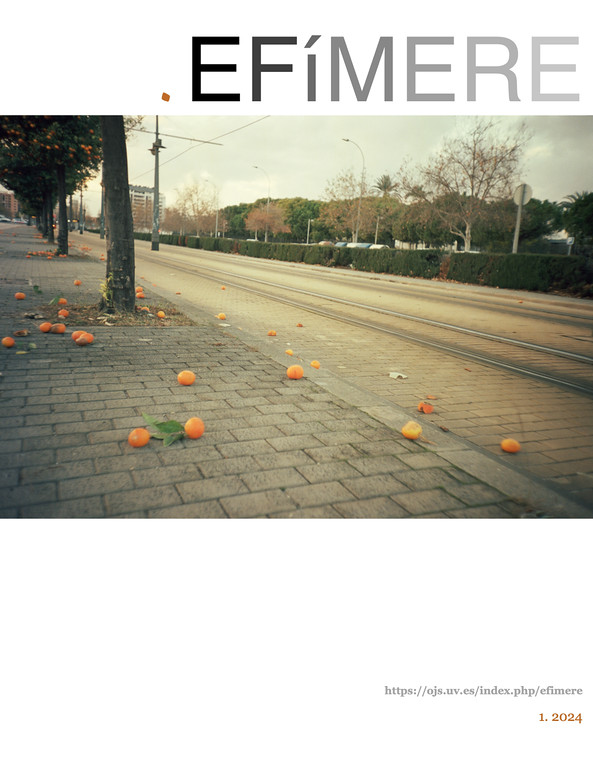Mescaline, rice and cart. A sociocultural reading of the “Moguda Valenciana” with a gender perspective
DOI:
https://doi.org/10.7203/efimere.1.26110 Abstract
Abstract
Turn-of-the-century Valencia became a cultural anthill where what has become known as the Moguda Valenciana began to emerge, closely related to the aesthetics that came from northern Europe -with a local reinterpretation- which would be the beginning of what became known as Ruta del Bakalao. Currently, we are experiencing a recovery of what the Moguda Valenciana meant in the cultural, social and artistic field, to the point of being considered an inclusive cultural scene, converted into a sign of identity of Valencia at the end of the 20th century. Now, it is possible that this consideration was due to a process of mythologizing of a movement that had been demonized in the collective imagination. That is why we have to approach the scene through its cultural products -music and plastic arts- and its sociability, to observe the situation of women in the Moguda Valenciana.
 Downloads
Downloads
 References
References
-Archilés, Ferran. (2012). “Sangre española”. La Movida Madrileña y la redefinición de la identidad nacional española en Archilés, Ferran y Sanz, Ismael (Eds.), La nación de los españoles, discursos y prácticas del nacionalismo español en la época contemporánea (pp. 437-461). Publicacions de la Universitat de València.
-Arzuaga, Irene (director). (2018). Ochéntame otra vez: más que bakalao [documental]. Ganga Producciones.
-B-Movie. (1980). Nowhere Girl [canción]. En Remembrance Day. Cleopatra Records.
-Chocolate. (29 de noviembre de 2022). Historia. Chocolate. https://discotecachocolate.com/historia/
-Cob, Ed. (1964). Tainted Love [canción]. En Soft Cell (1981), Non-stop erotic cabaret. Some Bizarre.
-Comité Cisne. (1987). Ana Frank [canción]. En El final del mar. Intermitente.
-Curtis, Ian. (1980). Love will tear us apart [EP]. Factory.
-Eldrich, Andrew. (1982). Alice [EP]. Marciful Release.
-Francino, Carles (productor). (1993). Hasta que el cuerpo aguante [documental]. Canal +.
-Glamour. (1981). En soledad [canción]. Imágenes. PolyGram.
-Glamour. (1981). Imágenes [canción]. Imágenes. PolyGram.
-Glamour. (1983). Intento olvidar [canción]. Guarda tus lágrimas. PolyGram.
-Hormigos-Ruiz, Jaime; Gómez-Escarda, María y Perelló-Oliver, Salvador. (2018) Música y violencia en España. Estudio comparado por estilos musicales. Convergencia, revista de ciencias sociales (vol 25, nº 76, pp. 75-98).
-Montón, Oscar (realizador). (2008). 72 horas...y Valencia fue la Ciudad [documental]. Texas Rangers producciones.
-Morrissey, Steven y Marr, Johnny. (1986). There is a light that never goes out [canción]. The queen is dead. Rough Trade Records.
-Pérez, Iván. (14 de maig de 2010). Las cenizas de la Ruta Destroy. El Mundo. https://www.elmundo.es/elmundo/2010/05/13/valencia/1273760726.html
-S/A. (4 de març de 2022). El IVAM expone el diseño gráfico de la Ruta del Bacalao. IVAM. https://ivam.es/es/noticias/el-ivam-expone-el-diseno-grafico-de-la-ruta-del-bacalao/
-Sanmiguel, Ángeles. (4 de setembre de 2017). La Ruta “en femenino”. Levante EMV. https://www.levante-emv.com/opinion/2017/09/04/ruta-femenino-13775071.html
-Scott, Joan. (2006). El eco de la fantasía. Ayer (nº62, pp. 111-138.
-Smith, Robert. (1989). Lovesong [Canción]. Desintegration. Elektra Records.
-Spivak, Gayatri. (2011). ¿Puede hablar el subalterno?. Cuenco de Plata.
-Uribarri, Jose Luis (director). (30 de gener de 1982) Aplauso (temporada 5) [programa de televisión]. En Cabañas, Martín; Rapallo, Carlos y Gracia, Jose Luis (productores), Aplauso. Radio Televisión Española.
-Visage. (1980). Fade to grey [canción]. Visage. Polydor Records.
Downloads
Published
How to Cite
-
Abstract108
-
PDF (Català)51







